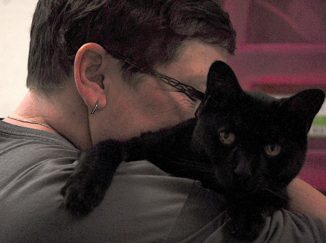
By Randy Arrington
STANLEY — After a decade in a loving home, Bootie found her way back to the Page County Animal Shelter in October. The black, sleek feline had been adopted from the shelter as a kitten, but now, at age 10, she was returned.
In years past her return would have meant a brief stay, but today the “no kill” facility has become her new home.
Under the previous policies, “an owner release could have been euthanized the same day, and with a 10-year-old cat that might have been the case,” shelter manager Jamie Cooper said. “There is always a home for a cat or a dog, and she has a home [here] until we place her.”
Earlier this week, Page County Administrator Amity Moler announced that the animal shelter had received a “no kill” designation for the second consecutive year. According to the shelter manager and employees, the only animals that are euthanized are either wild, considered unadoptable (for medical or behavioral reasons) or those deemed to be dangerous, usually mandated through a court order.
To earn “no kill” status, a shelter must keep its euthanization rate below 10 percent of the animals taken in for that year. In 2019, the Page County Animal Shelter only euthanized 5.4 percent of the animals it housed — 5 dogs and 28 cats in 12 months. In 2018, the numbers were similar — only 4 dogs and 29 cats.
Those low figures represent tremendous progress from 2011, when the county put down 66 dogs and 800 cats.
The “no kill’ movement is credited, in large part, to national activist Nathan J. Winograd, who leads the No Kill Advocacy Center in Oakland, Calif. In his book “Redemption: The No Kill Revolution in America” — which later was made into an award-wining film — he mentions Page County, and its dark days in animal control about 15 years ago. Conditions and treatment of animals was poor in a small, overcrowded facility near the old Stanley Landfill. When word of cats being shot in cages was made public, the situation drew the attention of animal rights activists from throughout the Mid-Atlantic region and beyond.
“It’s a tremendous difference from years ago,” said Shelby Jewell, a shelter employee who founded the local SPCA chapter in 1986. “Back then hardly any animals had a chance, but not anymore.”
On her first day of work at the Page shelter in 2005, Jewell remembers helping haul 2,500 pounds of dead carcasses to Greene County for disposal. But now, both Jewell and Cooper say the county’s animal shelter has come a long way in the last decade, and the “no kill” status serves as a sense of accomplishment.
“I think [the no kill status] is a wonderful thing,” Jewell said, “but if it wasn’t for rescues a majority [of the animals] would be put to sleep.”
A Trap, Neuter and Return (TNR) program conducted by Page Paws in recent years has curbed the cat population and brought down the number of intakes, according to the shelter manager. This year, Cat’s Cradle of Harrisonburg is taking over the program, with some financial support from Page Paws.
“Historically, dogs are easy to move or find rescue groups for… cats are a dime a dozen,” Cooper said. “I don’t know of a shelter that doesn’t have a lot of cats.”
The Page shelter also works with such rescue groups as Save the Tails in Loudoun County, the Humane Society of Warren County, Ragged Mountain Dogs of Sperryville, Northeast Coon Hound Rescue based in Massachusetts, and other regional SPCAs.
While only euthanizing 33 animals last year, the local animal shelter adopted out 84 dogs and 212 cats, in addition to reuniting 138 animals with their owners. Rescue groups took the rest.
Shelter resident Bootie has fewer fellow house guests this morning — Cat’s Cradle just picked up 10 cats from Page the day before.
The local SPCA intends to continue offering monthly spay and neuter clinics, and the shelter hopes local TNR programs resume as they work toward a third-straight year of “no kill” status.
“It has been a community effort,” Cooper said, “although a lot still needs to be done.”




Be the first to comment